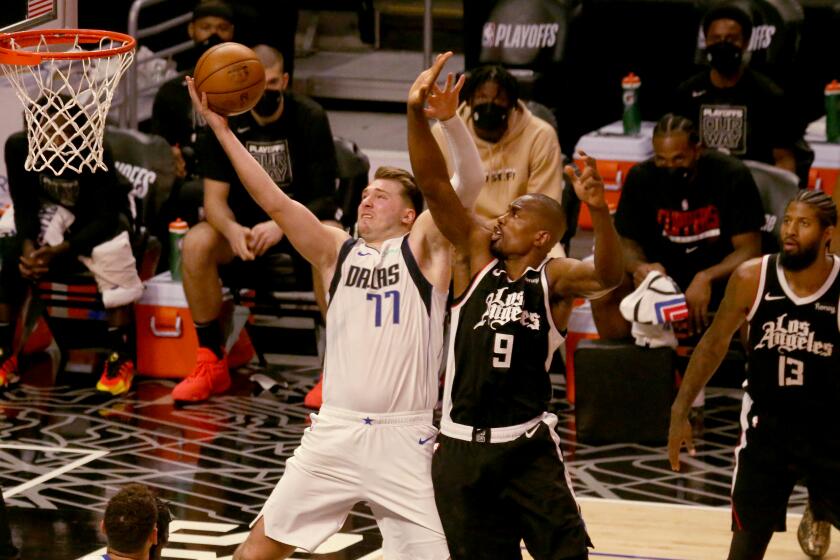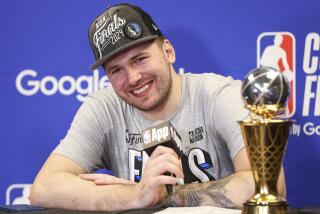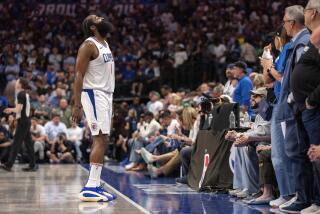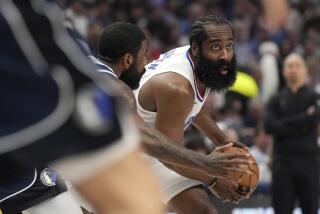Clippers’ big problem is stopping Luka Doncic. The answer may be the most obvious one
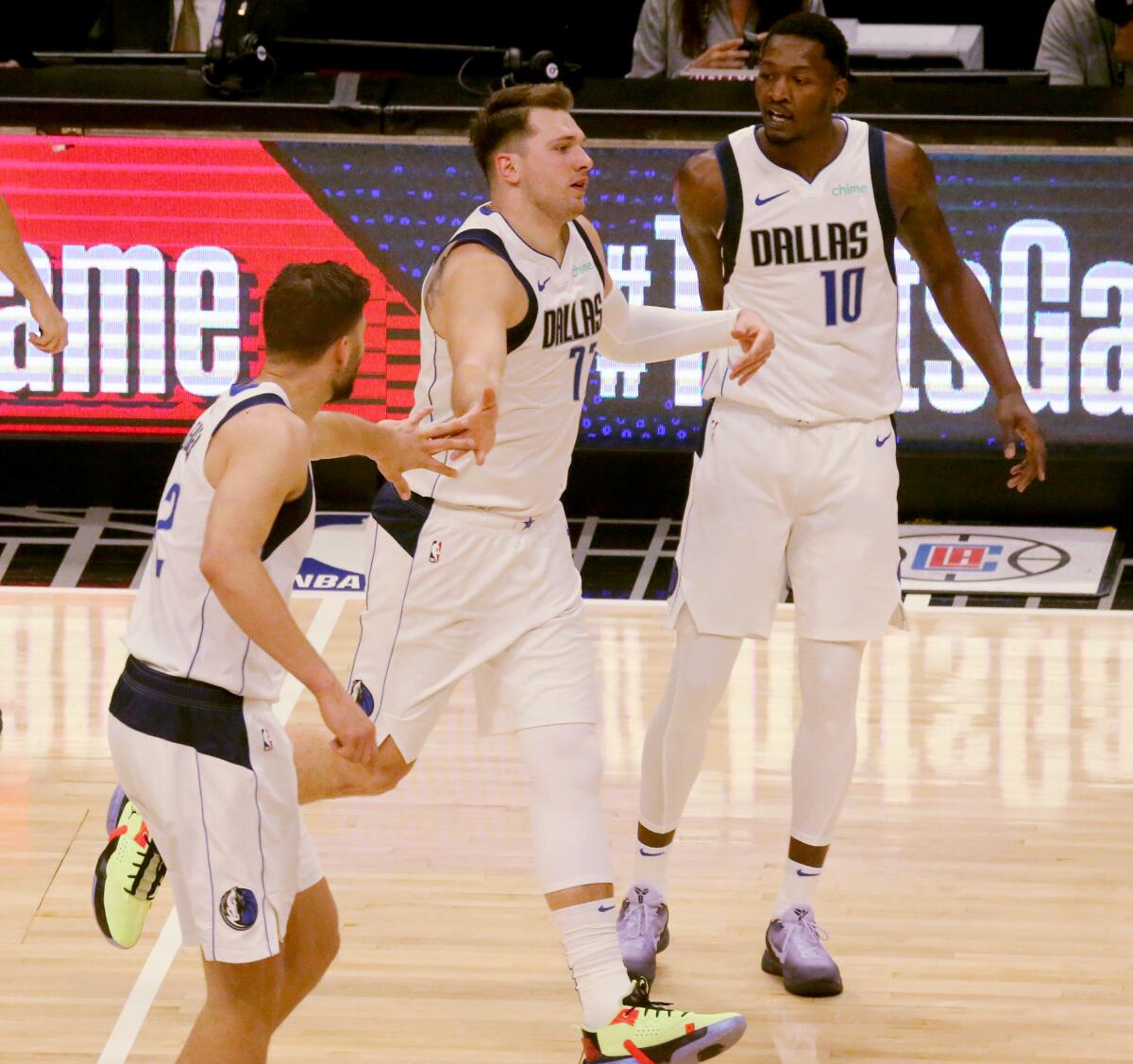
Stationed high in the corners of Staples Center, cameras tracking the moves of each player in the Clippers’ Game 1 loss to Dallas registered what the rest of the audience witnessed — Mavericks guard Luka Doncic finding success against defenders not named Kawhi Leonard.
In a league dominated by pick-and-roll offense, with defenders running a variety of coverages to stop it, deciding defensive matchups is not a straightforward exercise, which is why the NBA tracking data that generates such analysis often is presented with caveats. It generally tells the broader story, and Saturday, it was that Doncic scored 16 of his game-high 31 points when guarded by center Ivica Zubac. He was guarded most often by backup forward Nicolas Batum.
Why was Leonard, a six-time member of the All-Defensive team and a two-time defensive player of the year, not guarding Doncic more often than his credited 7.2 partial possessions, during which Doncic didn’t attempt a field goal or a free throw?
“He has to carry a lot of the load offensively, and we have three or four guys that we can put on [Doncic] and mix it up,” Coach Tyronn Lue said Sunday. “But, I think you’ll get what you’re asking for come Tuesday.”
If Leonard defends Doncic more often in Game 2, one concern will be keeping the Clippers’ leading scorer out of foul trouble, because Doncic doesn’t absorb contact from defenders as much as he creates it. Within the first four minutes of Game 1, he backed down Patrick Beverley in the post and drew two fouls.
Yet the Clippers’ defensive adjustments could be moot if all five players on the floor don’t communicate better, Lue said.
With Kawhi Leonard and Paul George leading what should be a revitalized franchise, the Clippers will have no excuse if they don’t get their act together against the Mavericks.
“I’m too embarrassed to say what the number was with points we gave up on our miscommunication and not following the game plan,” he said.
Lue added that the Clippers’ 17-6 deficit within the first six minutes Saturday reflected a relaxed approach that led to questionable shots, and transition opportunities and drives for Dallas.
“It’s the playoffs, you can’t ease into the game,” he said. “We gotta be physical right from the jump and have a defensive mindset.”
Yet as much as the Clippers’ adjustments must make Doncic’s life tougher, their hopes also rest on making their easiest shots.
In a season with a wide-open championship race, the Clippers’ case as contenders has hinged on their reliability in making more wide-open shots than anyone: Their 40.9% three-point accuracy when the closest defender was between four and six feet away led the NBA, as did their 44.4% shooting with the nearest defender six-plus feet away.
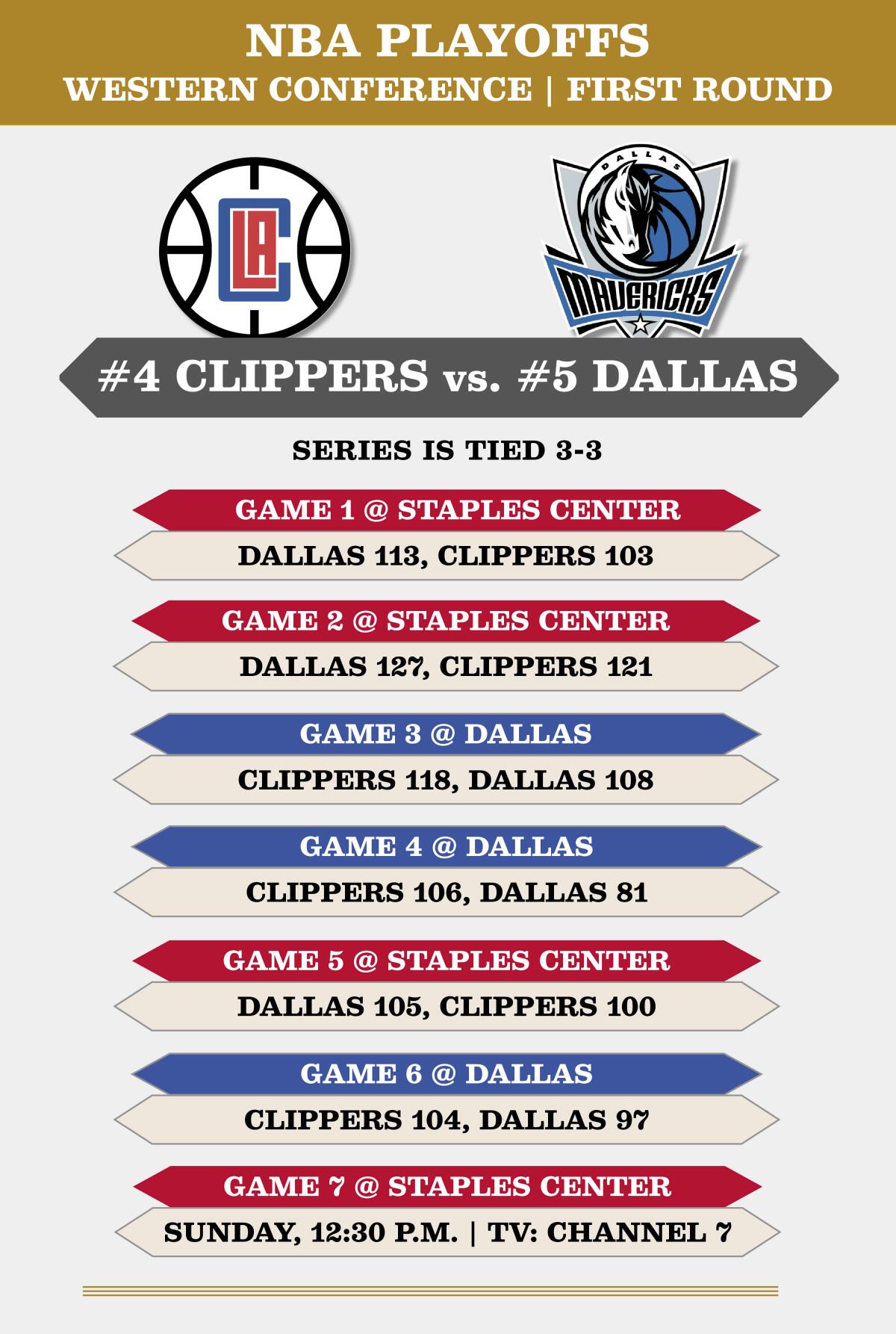
In Game 1, however, they made just 11 of 34 shots when the nearest defender was at least four feet away. Most troubling for the Clippers is that even though such shooting looks like an outlier, it fits in line with a trend when facing Dallas. During the teams’ three regular-season matchups, Los Angeles made only 23 of 84 three-pointers when a defender was at least four feet away.
“We did some good things rotating to shooters but we also have areas where we need to do much better,” Dallas coach Rick Carlisle said. “We have great respect for their team, for the way they shoot the ball and for their two superstar players. When those guys create a problem and we get in a situation where we need to double team, our rotations have to be lightning quick and on point.”
Throughout the season, the Clippers shook off dismal shooting performances. On five occasions, they shot 30% or worse from deep to make at least 48% of their three-pointers in their next game.
One of those examples started with an off night against Dallas. The Mavericks have held the Clippers to 30% three-point shooting or worse three times, including Game 1.

Highlights from the Clippers 113-103 loss to the Dallas Mavericks on May 22, 2021, at Staples Center.
“They did a good job of trying to run us off the line so we gotta do a better job of just attacking them,” Lue said. “I thought we had some good shots as well. When shots are not falling, they’re pretty low in the league, I think 29th in the league, as far as rim protection, so we gotta mix it up. We gotta take our shots, but we also gotta put the ball on the floor and drive and get to the paint, as well.”
Asked about the Clippers’ offensive breakdowns that led to just six points in the final 6 minutes 8 seconds, Lue added his team needed to “get to the paint or die trying — that’s what we have to do.”
More to Read
Get our high school sports newsletter
Prep Rally is devoted to the SoCal high school sports experience, bringing you scores, stories and a behind-the-scenes look at what makes prep sports so popular.
You may occasionally receive promotional content from the Los Angeles Times.

